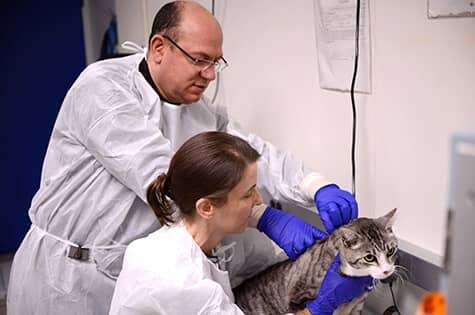A handful of cats over 8 years of age will develop hyperthyroidism which is usually a benign tumor of the thyroid that produces excessive thyroid hormone. Your family veterinarian can often diagnose this with labwork as well as weight loss and other symptoms of the disease.

Once diagnosed, it can be managed with an oral medication but there is a permanent solution – radioactive iodine!
Treatment by Radiotherapy
This therapy is generally considered the safest and most effective method of treatment for feline hyperthyroidism.
Your cat will be given an injection of radioactive iodine (iodine 131) and kept in the hospital facility until the radiation levels have reduced to be considered safe to take home. The time required varies by state with the average being three to four days. Treatment is not invasive and most cats tolerate brief separation from home without significant stress.
After release, there will be a period of time, usually about a week and a half, where the cat will need confinement, flushable cat litter, and restricted human contact because he or she may still emit low levels of radiation.

After this period, the cat is back to normal without restrictions and all that is left to do is return for some follow up lab work over the next few months. The radioactive iodine injection is given under the skin similar to a vaccine and the cat is basically boarding afterwards until the radiation levels drop.
This treatment works because iodine (radioactive or otherwise) is preferentially taken up by the greedy overactive tumor tissue of the thyroid and effectively destroys the thyroid tumor. Humans with hyperthyroidism are similarly irradiated. The potential for side effects with this therapy is very, very low and it is low stress for the cat.
Advantages of this Method of Radiation Treatment
- Treatment is a one-time event (only two to four percent of cats require a second treatment) and no on-going therapy is required.
- The disease is not simply managed but is actually cured!
- No anesthesia is required, indeed, treatment amounts to an injection followed by three to 7 days of boarding, very non-stressful especially considering the usual patient is an older cat with potential heart disease.
Disadvantages of this Method of Treatment
- Owner and pet are separated during the quarantine.
- Typically facilities require the cat to be confined indoors or have limited contact with owners for a period of time after discharge. Children and pregnant women should have no contact with the cat for a week or two after therapy. If this is too inconvenient to work out at home, the cat may be boarded at the radiofacility until this period has passed, but there will be additional expense for that.
- Facilities with capability of performing radiotherapy may not be conveniently located, although in most well populated areas, there are specialty hospitals that offer this
- This is a relatively expensive therapy and the facility’s cost does not include the required pre- or post-treatment diagnostics with your regular veterinarian. That said, a lifetime of medication and lab work checkups can also be costly and cause your cat stress
- Special flushable cat litter is required for one to two weeks after therapy.
- Some follow-up blood testing is generally recommended after treatment (typically one and three months after therapy).
- There is a chance (less than five percent) that the cat will become HYPOthyroid after treatment, requiring daily oral thyroid hormone supplementation – however, this is not difficult to regulate and long-term dose adjustments are unlikely
If kidney function is not thoroughly investigated prior to this therapy, latent kidney failure may be unmasked irreversibly by this therapy. Most veterinarians and specialists require medication to treat the disease and see the response, including unmasking kidney disease.
Kidney disease does not mean you cat should not get I-131. In fact, if the kidney disease is not advanced, radiation therapy to stop the hyperthyroidism can help spare the kidneys from very high blood and renal arterial pressure
Radiotherapy Facilities
Most general practices do not have radiation areas. Your veterinarian will refer you to a nearby facility


